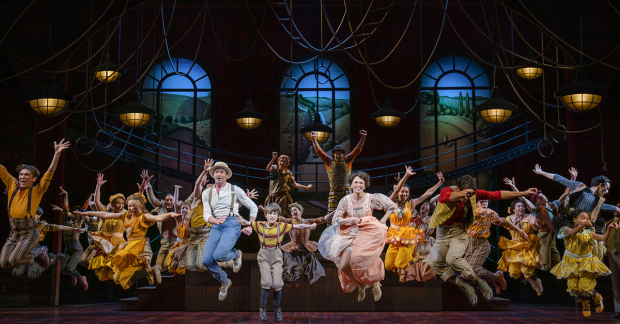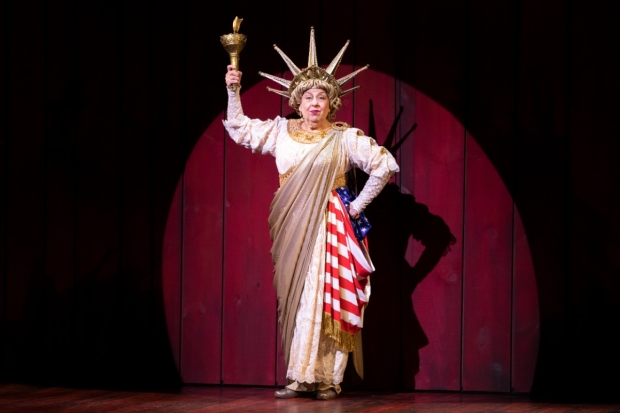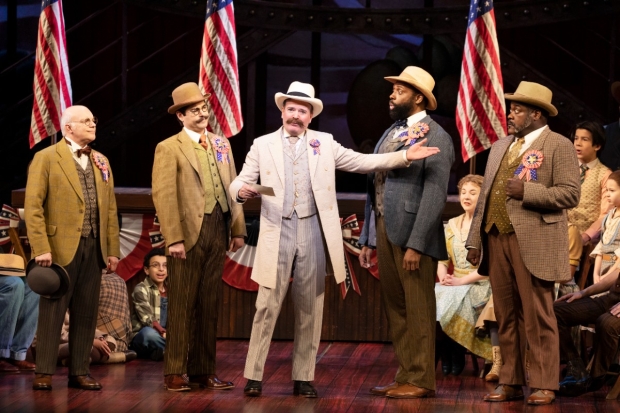Review: Hugh Jackman Is Starring in The Music Man. Does This Review Really Matter?
No, but here’s 900 words anyway.

(© Joan Marcus)
Let's cut to the chase, shall we? Is this new Broadway production of Meredith Willson's The Music Man, starring Hugh Jackman and Sutton Foster at the Winter Garden Theatre, a show for the ages? Well, no. Certainly not compared with the Bette Midler Hello, Dolly!, as insanely amazing a revival as I've ever seen, and built largely by the same creative team, led by director Jerry Zaks and choreographer Warren Carlyle.
Zaks doesn't give us a new revisionist take on The Music Man; this is not a Daniel Fish Oklahoma! situation where the layers are peeled back to reveal the rotten core of America. He doesn't try to tease out the obvious comparisons between the fictional flimflam man hoodwinking a community with the promise of salvation in the form of a boys' marching band and the real flimflam man who offered deliverance in the form of red hats and border walls. There's nothing insidious or subversive here, just…The Music Man. Wonderful dancing! A huge orchestra! A cast that's packed with talent (and more Tony winners than the actual awards). It's a perfectly enjoyable, not life-changing staging of a classic musical, and if you're looking for a night out that takes you away from the February doldrums, however briefly, this Music Man is a sight for sore eyes. But if you're looking for a Music Man that makes you want to stand up and cheer, this ain't it.
Jackman is Professor Harold Hill, that famed con artist who doesn't know the territory and gets more than he bargained for in River City, Iowa, when he meets Foster's Marian Paroo, the emotionally withdrawn librarian who's instantly onto his antics. When Marian's shy little brother Winthrop (Benjamin Pajek, the one cast member you leave talking about) bursts out of his shell with the promise of a gold cornet and a uniform with a stripe on the side, Marian can't help but fall, just like the rest of the town, for this silver-tongued con artist. And he's fallen right back.
There's no doubt in my mind that the directive here was to not spoil the high-paying audience's enjoyment and view of its marquee stars, whose names are typographically as big as the title. Everything has been designed to stay out of their way, from Santo Loquasto's sets, mostly made up of modest flats bearing the paintings of Iowan artist Grant Wood (grandiose and eye-popping these are not), to Carlyle's effervescent choreography and Zaks's blocking, which always place Jackman and Foster front and center. This production knows what its audience wants, and to be sure, it's not The Music Man or any other show: It's unimpeded time with Hugh Jackman and Sutton Foster, and in that respect, it delivers in spades.

(© Julieta Cervantes)
As it happens, neither Jackman nor Foster is a perfect fit for their roles; the way Harold and Marian are written doesn't play to either of their strengths. He's got all the charm but none of the smarm, while she's a little cold (though proves, once again, her adeptness at physical comedy). Nevertheless, they bend the mold to fit their specific skill sets: for Jackman, Carlyle turns everything into a big dance number that allows him to show off his nimble moves, while certain musical rearrangements almost let you to forget that Foster is a belter playing a near-operatic soprano role. What they don't have they make up for old-fashioned showmanship: They're working hard to keep the customers happy, and they do.
It should be noted that there are other people in the show, too: a gloriously befuddled Jefferson Mays as Mayor Shinn, Jayne Houdyshell giving real Miss Piggy energy as his wife, Irish actor Marie Mullen, who infuses Mrs. Paroo with genuine Irish warmth, and Shuler Hensley, an old foil for Jackman as Jud to his Curly in Oklahoma! 20 years ago, who plays the "Shipoopi"-singing Marcellus and valiantly makes his way through more PC but anachronistic new lyrics from Marc Shaiman and Scott Wittman ("Shipoopi/Shipoopi/Shipoopi/the boy who's seen the light/ Shipoopi/Shipoopi/Shipoopi/to treat a woman right"). They lead the deep bench of talent that's filled with familiar Broadway faces who not only look like they're having the time of their lives, but make backflips look easy.
And there are one or two genuine moments of real Broadway magic scattered throughout. Carlyle creates an entire imaginary marching band out of the townspeople in "76 Trombones," a terrific number I'd be happy to watch repeatedly. When that Wells Fargo Wagon rolls onstage with Jackman astride, tossing packages and musical instruments to the crowd, it made my heart leap out of my chest in the way that only a musical can.

(© Julieta Cervantes)
But those instances are few and far between at the Winter Garden Theatre, where Zaks's "don't get in the way of the stars" approach only allows us to have a good time, but not a great one. In the more disparate qualities of this production — Loquasto's uninteresting costumes, Brian MacDevitt's oddly sinister lighting, orchestrations by Jonathan Tunick, and dance arrangements by David Chase that are missing the essential spark of Willson's score — you can see an overextended director who had to rehearse two shows at once (this and Mrs. Doubtfire, both pandemic-related scheduling casualties) and let some things slide. The lack of cohesion really keeps this Music Man from achieving the level of magic that Dolly had.
So, is "perfectly enjoyable, not life-changing" worth some of the crazy prices people are paying? In my mind, no. But if you're able to drop $700 a ticket for two-and-a-half hours of entertainment, you probably don't care what I think, anyway. You're going for Hugh, and he won't let you down.









